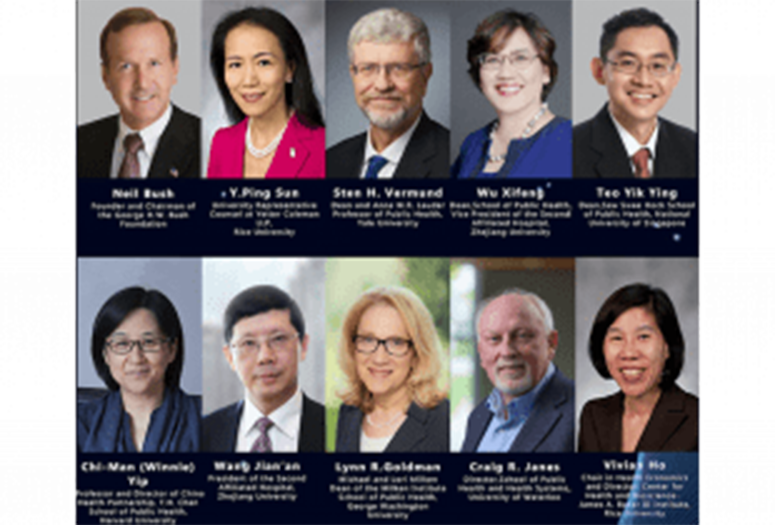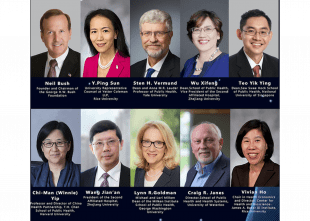Overcoming the challenges of COVID-19 and mapping the global community's path forward can only be achieved through cooperation and trust between nations, according to experts who participated in a webinar hosted by Rice and Zhejiang University.
The June 4 event was co-sponsored by Yale University, George Washington University, the National University of Singapore and the University of Waterloo.
Y. Ping Sun, University Representative at Rice and of counsel at Yetter Coleman LLP, stressed the importance of collaboration to address the impacts of COVID-19 in her opening remarks.
"Only by working together can we find the solution to this pandemic quickly," she said. "That's why we have assembled experts from Canada, China, Singapore and the United States to exchange ideas and share best practices."
Neil Bush, founder and chairman of the George H.W. Bush Foundation for U.S.-China Relations, then discussed his late father's thoughts on the relationship between the two countries.
"My father believed that (this) was the most important bilateral relationship in the world," he said. "Not only our country, but our world is facing the health challenges of a pandemic as well as the challenges of the global economy being shut down, but we're also seeing a rise in tensions between two great countries, the United States and China. And if there was ever a time in the world that we should pursue the ethos in the philosophy of George H.W. Bush, when we should collaborate and share best practices, that time is now.
"This is a time when we should find our common humanity, link arms and work together," Bush added.
Presentations were offered by Sten Vermund, dean and Anna M.R. Lauder Professor of Public Health at Yale; Wu Xifeng, dean of the school of public health and vice president of the Second Affiliated Hospital at Zhejiang University; Teo Yik Ying, dean of the Saw Swee Hock School of Public Health at the National University of Singapore; Chi-Man “Winnie” Yip, professor and director of China Health Partnership, T.H. Chan School of Public Health, Harvard University; Wang Yian’an, president of the Second Affiliated Hospital at Zhejiang University; Lynn Goldman, the Michael and Lori Milken Dean of the Milken Institute School of Public Health at George Washington and Craig Janes, director of the school of public health and health systems at the University of Waterloo.
They focused on strategies in the U.S., China, Singapore and Canada to prevent, contain and treat the virus, including alignment between public health experts and the government regarding COVID-19 prevention and control, and studies that are or should be conducted to assess the disease's social, economic and health impacts.
Vermund said "we've had a lot of warning" about these type of viruses, noting that China learned valuable lessons from its experience dealing with SARS.
"Unfortunately, the U.S. was not prepared," he said, noting that the country currently has the highest number of cases in the world.
Teo said countries such as China, New Zealand and Singapore have been effective and transparent in their communication about COVID-19, which has kept their citizens informed about new laws and regulations related to the pandemic and how to minimize risk to themselves and others. He also stressed the importance of intergovernmental partnership, especially as countries begin to ease restrictions and resume trade and travel.
"This requires transparency and trust between governments," he said.
Following the presentations, Vivian Ho, chair in health economics and director of the Center for Health and Biosciences at Rice’s Baker Institute for Public Policy, moderated a question-and-answer session with the panelists, and Wu offered closing remarks.
"We face a common destiny during a crisis like the unfortunate global pandemic of COVID-19," Wu said. "More than ever, we must gather wisdom and form a unit, not only as public health experts but as mankind, to fight the outbreak. Despite our differences, we are one human race with a common future."


